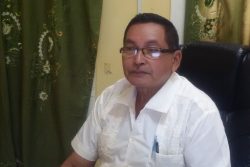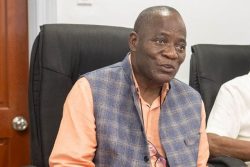Turning waste to energy is one of the areas being explored as plans begin to pilot a model green economy at Bartica in Region Seven.
Speaking to Stabroek News on the wings of a European Union sponsored panel discussion on climate change last week, Presidential Adviser on the Environment retired Rear Admiral Gary Best said President David Granger has said quite clearly that he is creating a green economy “and what he intends to do is that Bartica will be a model green community.” According to Best, the planning has started.
However, he could not say when government hopes to start implementing the project, though he noted that the President was anxious for an early rollout.
Noting that the Region Seven community will be designated a town, he said government’s entire approach to Bartica will be greening the economy so that it will become a model for the rest of the country. “The intention is to really utilise all the resources you have right now including international support to develop Bartica into a fully green economy,” he said, while adding that this will encompass the transport sector, waste-to-energy projects in Bartica, energy audits, integrated water management and how to reduce the amount of emissions that come right now from the fossil fuel driven plant that provides electricity in the community.
Among other ideas, Best said, is planting trees “to cool the town” as well as opening eco-lodges and promoting eco-tourism, and green tourism in Bartica. “So the idea is to make Bartica a model green community for the rest of Guyana,” he said.
In terms of energy, he noted that Guyana’s power generation is fossil fuel based and there needs to be an energy mix. “The next energy mix you can have really is photovoltaic, solar alongside the energy so you reduce the amount of fuel.
Then you can ramp that up from solar to wind if wind is a good option. Then you could have micro-hydros. In the context of Bartica, you could have micro-hydro, you could look at Tumatumari, you could look at Teperu, you could look at the Essequibo River, so there are options there. But if I were to make a recommendation, I’d say let’s start off with the PV, the photovoltaic and then the waste-to-energy plant, take the waste in Bartica and do a waste-to-energy project and use the energy to power Bartica also because it’s a fairly small community,” he asserted.
He said that moving to a waste-to-energy plant is one of the easiest things that can be done because Bartica has a problem with waste so energy can be generated from a properly managed landfill. He said that utilization of solar power can take place from the start and government buildings such as schools can easily make use of this power source.
Best could not say how soon the project could be implemented or the results seen and said it will take time. “An important ingredient in greening Bartica is the Barticians… changing the mindset of the Barticians,” Best said, while pointing to the many gas-guzzling pick-ups in the community.
“If you look at the 4X4’s, they are very shine and very clean,” he said. When it was stated that pick-ups are would be necessary for Barticians to go into the goldfields where many work, Best said that many only operate within the seven avenues and the ones that go into the interior have a “different face.”
Greening Bartica is also about changing the transport culture, he said while adding that Barticians can use bicycles once the roads have been improved and a tram-car system across Bartica and electric-powered vehicles can be examined. He emphasised that the community has to be involved all the way.








